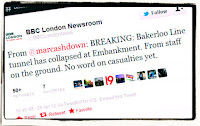Read Before Tweeting: Lessons from the Bakerloo Line "Colllapse"

Early on the morning of 26 April 2012 BBC London Newsroom tweeted breaking news that a tunnel had collapsed on the Bakerloo line of the London Underground. Less than an hour later they posted a correction withdrawing that report when it turned out that a train had just struck the side of a tunnel, bulging after heavy rain. Initially there were fears that people might be hurt or worse, so the news spread very quickly through Twitter. But even after the original source had tweeted a correction just 46 minutes later many people were still retweeting and forwarding the news several hours later. Old, inaccurate and out-of-date information often spreads in this way because it takes time for news to filter through a chain of people, so some Twitter users are seeing a retweet, a modified tweet or a paraphrase of the content long after the original tweet. They perhaps don't realize that the news is by Twitter standards very old and retweet or share it without thinking. In trad...




